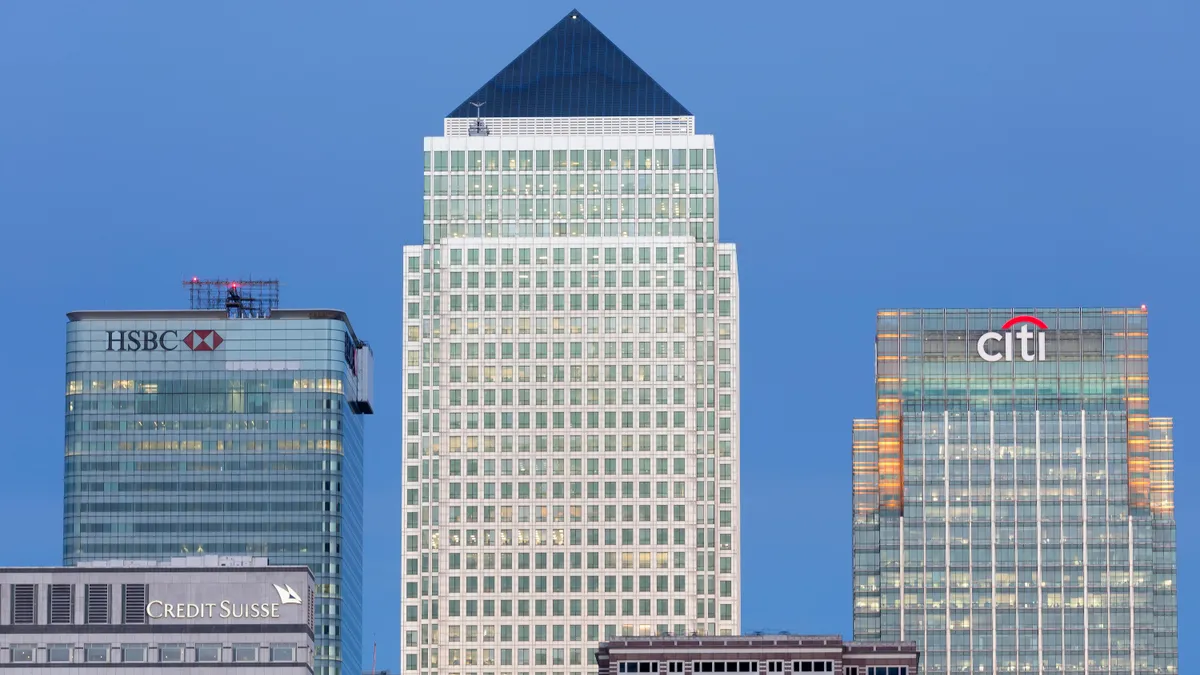Dive Brief:
- Citi, HSBC, Morgan Stanley and Royal Bank of Canada agreed Friday to pay roughly £104.5 million (around $132 million) to the U.K.’s Competition and Markets Authority to settle separate cases related to gilts.
- Between 2009 and 2013, individual traders at each bank, as well as Deutsche Bank, participated in private one-on-one exchanges in Bloomberg chatrooms, where they shared sensitive information related to the buying and selling of gilts and gilt asset swaps, the regulator said. Deutsche Bank is exempt from the fine for reporting its conduct.
- “The fines imposed today reflect the CMA’s commitment to dealing with competition law breaches and deterring anti-competitive conduct,” Juliette Enser, the CMA’s executive director of competition enforcement, said in a statement Friday. “The fines would have been substantially higher had the banks not already taken unusually extensive steps to make sure that this doesn’t happen again.”
Dive Insight:
Gilts are U.K. government bonds. Investors in gilts lend money to the U.K. government and receive steady cash interest payments in return.
Enser emphasized it is important for competitors to decide their prices and strategies independently to ensure healthy competition in the market.
“Only through healthy and competitive markets can we ensure businesses and investors have confidence to invest and grow – for the benefit of all in the UK,” she said.
The information exchanges that took place in separate bilateral online Bloomberg chatrooms between individuals at two banks involved one or more of the following: the sale of gilts by the UK Management Office via auctions on behalf of HM Treasury, the subsequent buying and selling such as trading gilts and gilt asset swaps, and the selling of gilts to the Bank of England, known as “buy back.” However, the CMA noted that not all banks were involved in “unlawful” exchanges in these contexts.
The last exchange for HSBC occurred in 2010, for Morgan Stanley in 2012, and for Citi, Deutsche Bank and RBC in 2013.
Deutsche Bank has immunity from the fine since it reported on its involvement in the chats via the CMA’s leniency policy. Citi, for its part, applied for leniency during the agency’s probe and received a reduced fine.
According to the CMA’s leniency policy, any business involved in “cartel activity” may be granted immunity or a reduced penalty if it reports the activity and assists the agency with its investigation.
Citi will pay £17.20 million, including a 35% leniency discount and a 20% reduction for settling before the CMA issued its Statement of Objections.
“We are pleased to resolve this longstanding matter with the CMA from over a decade ago. We cooperated fully with the CMA and remain committed to ensuring full regulatory compliance,” a Citi spokesperson said in a statement.
HSBC will pay £23.4 million. Morgan Stanley £29.7 million. And RBC must pay £34.2 million. Each include a 10% reduction for settling after the CMA issued its Statement of Objections.
The information exchange for Citi, Deutsche Bank, HSBC and Morgan Stanley involved a single trader based in the U.K. For RBC, the exchange occurred on two events by two traders based in the U.K. None of the traders are still with the bank they worked for at the time, the agency said.
The fines were based on the significant amount of time since the violations occurred and the banks' implementation of extensive compliance measures since then.
HSBC and RBC said they were pleased to resolve the matter.
“The conduct in question was historic and our compliance environment has significantly enhanced over the last decade since it occurred,” an RBC spokesperson told Banking Dive in an emailed statement. “We do not tolerate misconduct of any kind and are committed to treating employee misconduct very seriously and meeting all regulatory requirements. The two employees who engaged in the conduct in question are no longer with the bank.”
A spokesperson for HSBC said the CMA’s concerns revolved around “a small number of historic communications between HSBC and Deutsche Bank” that happened 15 years ago.
“Since that period, we have transformed our controls and the CMA itself has acknowledged we now have a robust compliance programme,” the spokesperson added.
Morgan Stanley did not reply to the request for a comment by press time.
The lenders must pay the fines by April 22.














